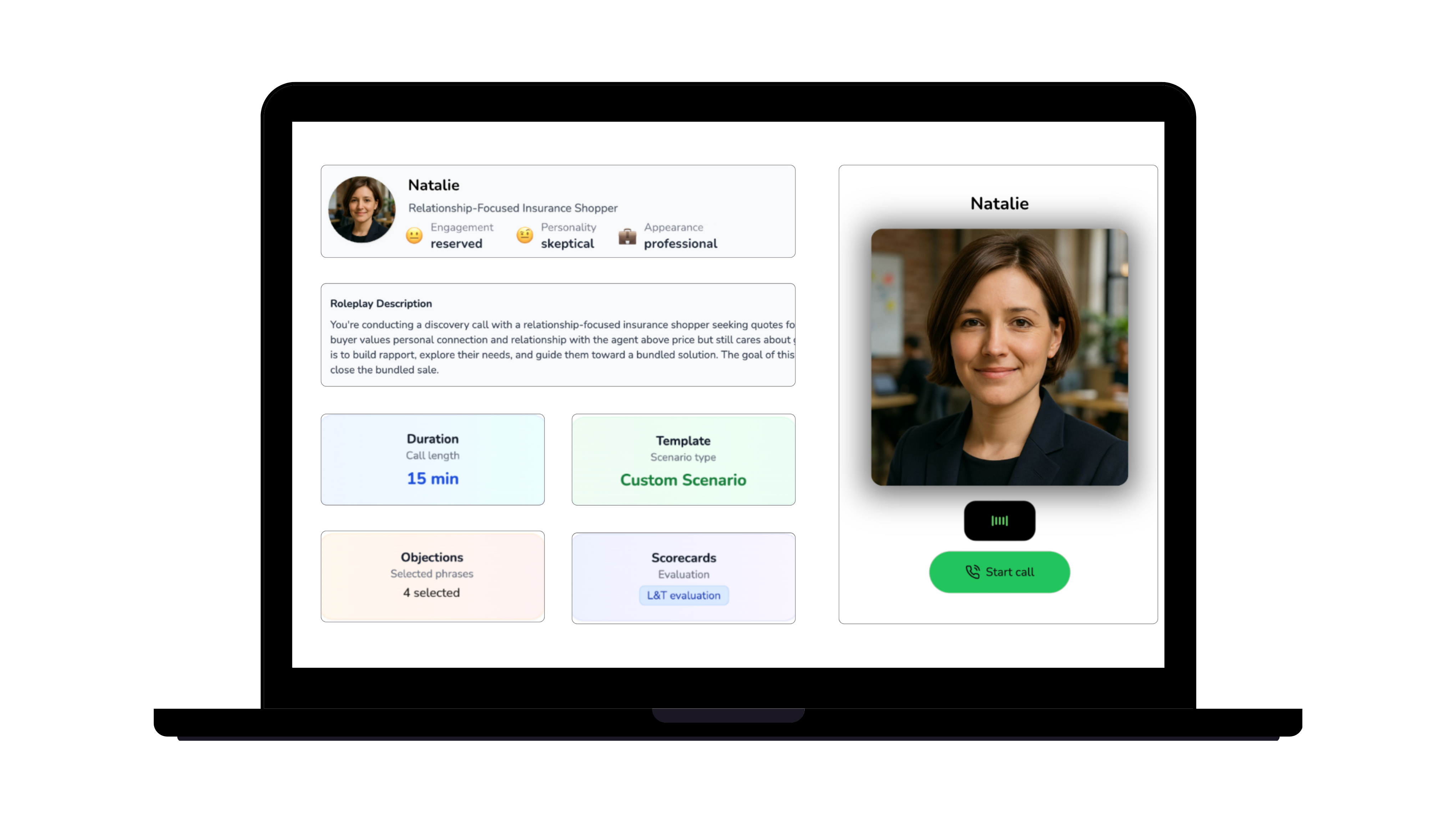
Here's the uncomfortable truth about traditional sales training: your reps forget most of it. Within just one month of onboarding, nearly four-fifths of the information disappears from their minds. They walk into their first sales calls overwhelmed, underprepared, and frankly, terrified of saying the wrong thing.

But imagine if your newest hire could practice that difficult objection handling scenario ten times before breakfast. Picture your top performer rehearsing a high-stakes enterprise deal in a judgment-free environment at midnight. Envision your entire sales team getting consistent, objective feedback without monopolizing your managers' calendars.
This is what AI sales roleplay tools make possible right now.
In this article, we will analyze why AI-powered roleplay has become essential for modern sales teams, exploring seven compelling reasons that are transforming how successful organizations train, coach, and enable their sales professionals.
Before we dive into the reasons, let's establish what we're talking about. AI sales roleplay isn't your typical "pretend I'm the customer" exercise with a colleague. Instead, you're engaging with intelligent systems that simulate real buyer personas, sharp and unpredictable characters who mirror the actual challenges your reps face in the field.
These tools provide instant, data-driven feedback on everything from tone and pacing to keyword usage and objection handling techniques. No waiting for your manager to review the recording. No subjective opinions colored by someone's mood or biases. Just consistent, actionable insights that help reps improve immediately.
The technology has evolved beyond simple chatbots into sophisticated platforms that understand context, respond naturally, and adapt to your sales methodology.
Your new sales reps don't have six months to become productive. Yet traditional onboarding approaches create exactly this extended ramp period, filled with passive learning and infrequent practice sessions squeezed between managers' busy schedules.
AI roleplay eliminates these bottlenecks by letting reps practice from day one. They don't wait for scheduled training sessions or hope to shadow the right calls at the right time.
Key benefits include:
Think about the compounding effect here. A rep who practices three scenarios daily accumulates real skills that stick, while their traditionally trained counterpart might get one awkward roleplay per week.
Let's address the elephant in every sales training room: traditional roleplay is awkward. Really awkward.
Nobody enjoys stumbling through objections while their peers watch. The pressure of performing in front of managers creates stress that doesn't reflect actual sales situations.
AI roleplay transforms this dynamic completely:
This psychological safety isn't just about comfort it also changes how reps approach practice. They become willing to push themselves beyond their current capabilities and find what works naturally for them.
Traditional sales coaching faces an impossible math problem. You have limited managers and trainers, each with only so many hours in their day. Meanwhile, you have growing teams spread across locations, time zones, and experience levels.
AI roleplay solves this scaling challenge by offering:
Whether your sales team has five members or five hundred, the quality of practice remains constant.
Not every rep struggles with the same skills. Some naturally excel at building rapport but fumble when discussing pricing. Others nail product demonstrations but miss opportunities to ask probing discovery questions.
AI roleplay platforms recognize and respond to individual performance patterns:
For sales managers, this granular performance data transforms coaching conversations. You're no longer guessing where reps need help; you have objective metrics showing exactly where to focus.
Real sales opportunities don't wait for convenient practice schedules. Your most important deal of the quarter might require a presentation tomorrow morning. That enterprise prospect with the notoriously difficult procurement team? They just agreed to a call this afternoon.
AI roleplay enables just-in-time preparation:
Traditional coaching often relies on subjective observations colored by timing, relationships, and personal biases. A manager reviewing roleplay performances at the end of a stressful quarter might provide harsher feedback than during a holiday week.
AI roleplay introduces objective measurement into sales training:
The objectivity transforms coaching conversations from:
"I think you should..."
to
"the data shows top performers average seven discovery questions while you're asking three. Let's practice frameworks that help you dig deeper."
Sales isn't static. Your products evolve, competitors shift their positioning, market conditions change, and new objections emerge. Traditional training struggles to keep pace with this constant evolution.
AI roleplay platforms enable continuous adaptation:
This agility helps organizations create competitive advantages that compound over time. While competitors rely on periodic training events, forward-thinking teams build cultures of constant improvement.
If you're interested in exploring additional applications of AI in modern sales processes, here are 4 more ways you can use AI in sales today.
Understanding why AI roleplay matters is one thing. Seeing it work in action is another. SellMeThisPen helped Ergeon, a home improvement company, revolutionize their sales training approach.
Ergeon faced typical challenges: inconsistent coaching across their distributed team, limited manager bandwidth, and difficulty scaling quality training. SellMeThisPen provided realistic buyer personas, on-demand practice scenarios, and instant feedback that transformed their results.
The impact was measurable:

What made the difference? Reps could practice specific scenarios before important calls, managers could focus on strategic coaching, and the entire team had access to consistent training regardless of location or schedule.
You can read the complete Ergeon success story with SellMeThisPen AI to see exactly how they implemented the platform and the specific improvements they achieved.
The most successful approach to AI roleplay involves:
The question isn't whether AI will transform sales training - it already has. Forward-thinking organizations are leveraging these tools to build more capable, confident, and successful sales teams right now.
Your reps deserve preparation that matches the difficulty of their jobs. Your managers deserve tools that multiply their coaching impact. Your organization deserves a competitive advantage built on superior skills and consistent execution.
The seven reasons we've explored demonstrate why AI sales roleplay has become essential rather than optional:
AI sales roleplay delivers all of this, and the technology is ready today. The only remaining question is when you'll give your team this advantage.